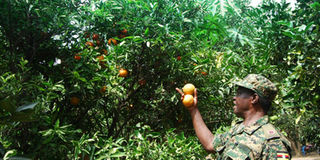Farmers squeeze cash from oranges

OWC officer Maj Alonya inspecting one of the citrus farms in Ngetta sub county Lira District recently. Photo by Tobbias Jolly Owiny
What you need to know:
- Citrus farmers from northern Uganda have had a good season. Farmers such as Milton Abua have been harvesting 500 orange fruits per plant. Abua earned Shs5m in December after selling to middlemen exporting to South Sudan, writes Tobbias Jolly Owiny
Milton Abua, a model citrus fruit farmer says the key to having a successful orange farm (orchard) is producing a high-quality harvest.
Abua and many other citrus farmers in Lira District have been cashing in from the fruit since late last year.
According to Abua, weeding, pruning and fertilising are of the utmost importance, as is providing the proper micronutrients to the plants.
Profitability
Brand your farm: However, to increase profitability, you (a farmer) may need to become creative in your branding and marketing techniques. “If your farm is certified organic, produces a highly desirable oranges in the district, has an interesting story, capitalize on it. Use this information in your marketing materials such as brochures, leaflets and mediums including Facebook, WhatsApp, and website,” advises Abua who received 200 hybrid seedlings of oranges from operation wealth creation under Naads four years ago.
In December last year, Abua made about Shs5m from orange sells. Previously he was earning less than Shs1m from the same acreage of land.
Bring the oranges to buyers: Bonny Ogwal, a farmer in Adekokwok Sub County, Lira District is the owner of Ogwal fruit farm. Ogwal says he began thriving his farm by giving away most of the fruits to school goers, town dwellers and village mates.
Because of the exceptional flavour, he garnered an excellent reputation. This earned him the attention of local leaders and traders. “Awareness is vital. The friendship I created with the locals has enabled me recover the capital,” he says.
Grow the best: Jessica Onyait a farmer in Serere District, advises other farmers to take all steps possible to create the most flavourful fruit possible to maximize profitability. “You have to plant the latest varieties which give more juice,” she says.
Be creative: Offer farm tours and training programmes to both agriculture students and other farmers. Consider selling the pruned branches as specialty fuel for mothers in the village.
“This helps you to create the market,” says Abua. Market your farm. “Write interesting and creative articles to drive traffic to your website and perhaps garner media attention.
You can also establish WhatsApp group for your farm.
Market challenges
While other are smiling to the banks, some are living with the fact that thousands of oranges will be destroyed if no new market is found. The farmers have since last year been desperately looking for orange consumers or buyers after a bumper harvest of more than 100,000 tonnes of the fruit.
“Wholesalers are paying peanuts. Most farmers have had to sell at losses,” explains Ogwal.
Storage
• Store them (oranges) in the refrigerator. Oranges tend to preserve best at cooler temperatures and deteriorate quickly at warmer temperatures. Keeping them refrigerated will slow down the deterioration process and will help to maintain freshness for an extended period of time.
• Keep them dry. Damp oranges that have been stored may quickly become moldy. Ensure that there is no moistness or water droplets on the skin of the fruit.
• Keep them on the counter. Oranges kept on a store counter or a table will remain fresh for up to one week at room temperature, depending on how fresh they were to begin with.
• Do not cover the bowl with plastic wrap or foil. Airflow is important to keeping oranges fresh.
Advice
Because of bumper harvest, most farmers have been advised to add value to oranges. “Farmers lack capital for value addition,” says Okello.
How to keep oranges longer on the shelf
Despite their thick skins, oranges do not last long after harvest. There are several ways to store the oranges to ensure that they will last. The longest storage time can be achieved through preserving the oranges or freezing them, but if this is too much work, you can make adjustments to your harvest time and method so you can have fresh oranges over several weeks.
Harvesting
When you harvest oranges, it means you have determined their final flavour because the fruits do not ripen after you pick them. Tasting individual fruits for flavour is the best way to be certain that you are picking ripe oranges. Keep a watch during harvesting for any oranges that have bruised or torn skins. These oranges must be used immediately to keep them from spoiling.
Room temperature
After harvesting, fresh, whole oranges may be kept on the counter at room temperature for up to a week before they begin to degrade. Moisture may cause mold to develop on the orange skin, which can penetrate the fruit to the inside, ruining it. If you live in a humid area, consider refrigerating your oranges for longer storage or wrapping them in wax paper to protect the fruit from mold.
Refrigerated
Refrigerated oranges last longer than those kept on the counter because the lower temperatures in the refrigerator slow the growth of molds.
It should be two to four weeks in the vegetable crisper drawer before you notice any decrease in fruit quality or mold formation. At the first signs of mold, discard the fruit, regardless of how long it has been stored.
BARE FACTS
Amazing. The Orange slices or juice may be frozen for longer storage, but for the best quality, freeze the juice or pack the oranges in sugar before freezing. Do not freeze navel oranges in any form because the freezing process will render them irreparably bitter.
Truth. The best way to keep oranges from going bad for several weeks is to leave them on the tree.
Source: Homeguides.com




